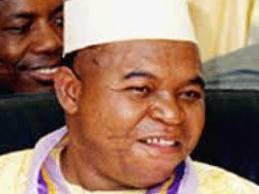Erstwhile Kogi State Governor, Abubakar Audu’s six-year travail over an alleged N4bn scam will not be over anytime soon as he had anticipated, following a Supreme Court ruling on Friday that dismissed his appeal and consequently paved the way for his fresh arraignment by the Economic and Financial Crimes Commission (EFCC).
Audu had been originally arraigned on 1st December 2006 on an 80-count criminal charge of fraud and embezzlement of public fund worth north of N4bn during his four-year governorship reign of 1999 to 2003.
“That you, Prince Abubakar Audu, on or about 6th day of February 2001 at Kogi State Judicial Div. by false pretence and with intent to fraud obtained from Kogi State Directorate of Rural Development, the sum of N6, 263.000 purporting same to be part payment made to Leo Flinch Nig. Ltd in respect of a contract allegedly awarded by Kogi State Directorate of Rural Development to the said Leo Flinch Nig. Ltd and you thereby committed an offence punishable under section 1 (3) of the Advance Fee fraud and other related offences Act 13 of 1995 as amended by Act No 62 of 1999,” count one of the 80-count charge reads.
EFCC was forced to initiate a nolle prosequi issued by former Attorney General of Kogi state, Dr. John Alewo Agbonika and the Attorney General of the Federation, Chief Bayo Ojo on 8th February 2007 for the discontinuation of the case at the Kogi State High Court, claiming lack of faith in the handling of the matter by the Court.
“In my capacity as the AG of Kogi state in collaboration with the AG of the Federation and by virtue of the power vested in me by Section 211 of the Constitution of the Federal Republic of Nigeria 1999 and Section 253 of the CPC and all the powers enabling me in that behalf, I Dr. John Alewo Agbonika hereby inform this honourable court that I no longer intend to continue the prosecution of this case in collaboration with the AG of the Federation to whom I had given a fiat to prosecute this case,” a part of Agbonika’s discontinuation read.
However, the trial judge, Justice Medupin, dissented, instead referring two questions to the Court of Appeal for determination.
In a judgement delivered by Justice Bode Rhodes-Vivour, the Supreme Court held that the Court of Appeal was wrong to consider the questions referred to it for determination after being aware from the records of Appeal that a nolle prosequi had been filed. The Supreme Court argued that “there was nothing before the trial court, so there would be nothing for the Court of appeal to send back.”
“It amounted to an academic exercise for the Court of appeal to waste judicial time considering questions from a case that is no longer in existence,” it said. “There was no longer live issue to be considered by the Court of appeal in view of nolle prosequi filed in the trial court.”
The case had endured several setbacks, including the filing of several applications for stay of proceedings at the high court pending the final determination of the appeal. Notably, Audu’s lead counsel, Mike Ozekhome (SAN) filed the stay of proceedings motion supported
by 11-paragraph Affidavit, on 12th December 2011. This occurred 26 days after the Supreme Court of Nigeria, on 16th November 2011 struck out a similar application he filed on 24th January 2011.
In Justice Husseini’s ruling of 10th June 2011, he held that “the starting point was the re-arraignment of the accused (Ex-governor Abubakar Audu) by taking his plea afresh,” since the matter was starting de novo and since he had been newly transferred to the court,
Abubakar again appealed, filing a motion for a stay of proceedings. “The case at the Court of Appeal is attacking the jurisdiction of the court to re-arraign the accused person; that motion is pending. The appellate courts are obliged to take these cases separately and determine its merit and demerit, no matter how frivolous it is. Like Pontius Pilate, wash your hands off until the Court of Appeal and the Supreme Court concludes this case,” Ozekhome had told the court.
Led by Chief Justice of Nigeria Justice Dahiru Musdapher, five justices sat in chambers and delivered a ruling that was presented before Justice Saidu Tanko Husseini of High Court of Kogi State on 9th December 2011 when the case came up.
Ozekhome argued against the presentation of the ruling by prosecution counsel, Rotimi Jacobs, claiming oblivion of the concept of “sitting in chambers” in his 30 years at the bar. He further described the Supreme Court’s ruling as a possible forgery that he must verify but after the judge obliged his prayers and adjourned till 22nd December 2011, he surprisingly filed another stay of proceedings at the High Court within three days.





